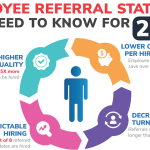When looking to tap into your employee base as a potential to fuel your candidate pipeline, the first thing that comes to mind is “how much should we pay for a referral bonus?”. The reality is that there are actually several layers to a proper employee referral policy. Your policy is the foundation for a successful employee referral program. By providing the right incentives, and structuring it the right way, you can ensure employee participation and avoid costly management mistakes.
Referral Bonus
The obvious one is first: how much should you pay an employee for referring a candidate that you hire? The bonus can vary dramatically based on the type of business and level of position, but here are some generalizations that should help:
The average overall bonus is typically between $1000 – $3000. Fast-growing businesses and companies fighting for top talent (typically specialized skill sets, such as developers) will put their standard referral at $5000+. It’s also not uncommon to also tier the bonus, making higher level positions such as managers, directors, VP, etc at $7,500, $10,000 or more.
Businesses with lower starting salaries, temporary hires, 1099 employees, and general fast turn over will be set as low as $100.
While the range can be dramatic ($100 – $10,000) the result of an employee referral often produces a higher quality employee with a better culture fit – at a fraction of the cost of an external recruiter!
Bonus Bonus
Something you may not have thought about is paying an additional bonus for a better-qualified candidate. For example, paying an extra amount when a candidate brings more years of industry experience or a unique bonus skillset that is in high demand, but not critical for the position. Paying an additional bonus for more desired candidates will communicate to your employees the skillets that your company is willing to invest in, allowing them to be more thoughtful when considering who to refer.
Timeline and Stipulations
An employee makes a referral, you hire them, great! You’re done… right? Not yet. It’s best practice to have terms around the employment before the referral bonus is paid. This can help prevent paying bonuses that don’t’ result in successful employment but also help stress that bad referrals won’t pay off.
A common tactic to ensure you’ve made a successful hire is to set a time period of employment before the bonus is paid. For example, bonuses will only be paid after the candidate has been employed for more than 90 days. This help eliminates the risk of a hire that doesn’t work out, but still being paid. Only pay for the good candidates that actually become employees!
Documentation
It’s critical that your policy, bonuses, and referral activity is documented every step of the way. This provides your employees with proper explanations on what to expect and gives your management teams specifics on how bonuses are paid and earned.
Make sure that your policy is distributed every time that is updated, and provide proper workflows on how referrals are to be made. This will help eliminate perceived obstacles for your employees making referrals (ex I don’t know who to speak with about my referral).
In general, your policy should be precise and easy to follow. The more steps it takes to make a referral, the less likely your employees are to participate. Furthermore, if the record keeping and communication between your recruitment team isn’t strong employees will be discouraged, producing fewer referrals. Starting with a strong policy is the key to enabling your business to build a strong candidate funnel that will consistently produce high-quality top talent candidates.






